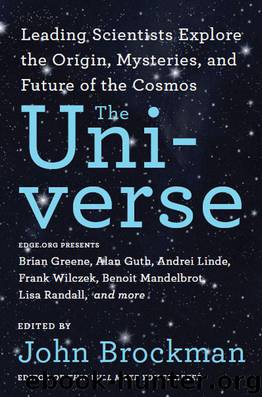The Universe: Leading Scientists Explore the Origin, Mysteries, and Future of the Cosmos by Brockman John

Author:Brockman, John [Brockman, John]
Language: eng
Format: epub
Publisher: HarperCollins
Published: 2014-07-07T16:00:00+00:00
12
Science Is Not About Certainty
Carlo Rovelli
Theoretical physicist, Professeur de classe exceptionelle, Université de la Méditerranée, Marseille; author, The First Scientist: Anaximander and His Legacy
INTRODUCTION by Lee Smolin
Carlo Rovelli is a leading contributor to quantum gravity who has also made influential proposals regarding the foundation of quantum mechanics and the nature of time. Shortly after receiving his PhD, he did work that made him regarded as one of the three founders of the approach to quantum gravity called loop quantum gravity—the other two being Abhay Ashtekar and me. Over the last twenty-five years, he has made numerous contributions to the field, the most important of which developed the spacetime approach to quantum gravity called spin-foam models. These have culminated over the last five years in a series of discoveries that give strong evidence that loop quantum gravity provides a consistent and plausible quantum theory of gravity.
Rovelli’s textbook, Quantum Gravity, has been the main introduction to the field since its publication in 2004, and his research group in Marseille has been a major center for incubating and developing new talent in the field in Europe. Carlo Rovelli’s approach to the foundations of quantum mechanics is called relational quantum theory. He also, with the mathematician Alain Connes, has proposed a mechanism by which time could emerge from a timeless world—a mechanism called the thermal time hypothesis.
Science Is Not About Certainty
We teach our students: We say that we have some theories about science. Science is about hypothetico-deductive methods; we have observations, we have data, data require organizing into theories. So then we have theories. These theories are suggested or produced from the data somehow, then checked in terms of the data. Then time passes, we have more data, theories evolve, we throw away a theory, and we find another theory that’s better, a better understanding of the data, and so on and so forth.
This is the standard idea of how science works, which implies that science is about empirical content; the true, interesting, relevant content of science is its empirical content. Since theories change, the empirical content is the solid part of what science is.
Now, there’s something disturbing, for me, as a theoretical scientist, in all this. I feel that something is missing. Something of the story is missing. I’ve been asking myself, “What is this thing missing?” I’m not sure I have the answer, but I want to present some ideas on something else that science is.
This is particularly relevant today in science, and particularly in physics, because—if I’m allowed to be polemical—in my field, fundamental theoretical physics, for thirty years we have failed. There hasn’t been a major success in theoretical physics in the last few decades after the standard model, somehow. Of course there are ideas. These ideas might turn out to be right. Loop quantum gravity might turn out to be right, or not. String theory might turn out to be right, or not. But we don’t know, and for the moment Nature has not said yes, in any sense.
I
Download
This site does not store any files on its server. We only index and link to content provided by other sites. Please contact the content providers to delete copyright contents if any and email us, we'll remove relevant links or contents immediately.
| Aeronautics & Astronautics | Astronomy |
| Astrophysics & Space Science | Comets, Meteors & Asteroids |
| Cosmology | Mars |
| Solar System | Star-Gazing |
| Telescopes | UFOs |
Tools of Titans by Timothy Ferriss(8369)
Turbulence by E. J. Noyes(8040)
Secrets of Antigravity Propulsion: Tesla, UFOs, and Classified Aerospace Technology by Ph.D. Paul A. Laviolette(5367)
Astrophysics for People in a Hurry by Neil DeGrasse Tyson(5182)
Room 212 by Kate Stewart(5105)
Design of Trajectory Optimization Approach for Space Maneuver Vehicle Skip Entry Problems by Runqi Chai & Al Savvaris & Antonios Tsourdos & Senchun Chai(5066)
Pale Blue Dot by Carl Sagan(4996)
The David Icke Guide to the Global Conspiracy (and how to end it) by David Icke(4709)
A Journey Through Divination and Astronomy by Publishing Pottermore(4379)
Goodbye Paradise(3802)
Apollo 8 by Jeffrey Kluger(3702)
COSMOS by Carl Sagan(3618)
The Five People You Meet in Heaven by Mitch Albom(3561)
Losing the Nobel Prize by Brian Keating(3534)
How to Read Water: Clues and Patterns from Puddles to the Sea (Natural Navigation) by Tristan Gooley(3466)
Brief Answers to the Big Questions by Stephen Hawking(3430)
How to Read Nature by Tristan Gooley(3335)
The Order of Time by Carlo Rovelli(3188)
A Brief History of Time by Stephen Hawking(3022)
